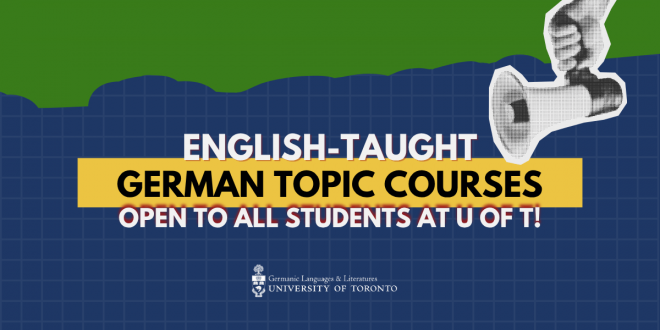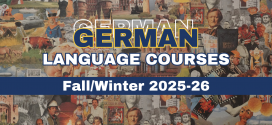Discover Our English-Taught Topic Courses – Open to All U of T Students!
Are you curious about German culture, history, or thought, but don’t speak German (yet)? We invite you to explore our English-taught Topic Courses, open to all U of T students and requiring no prerequisites. These courses offer an excellent opportunity to discover whether German studies might be right for you, whether you’re interested in the German culture, language, or future academic or professional pathways.
With a range of themes, you’re sure to find something that sparks your interest. Scroll down to read detailed course introductions and find the one that speaks to you!
GER150HF Introduction to German Culture
| Section | Time | Instructor |
|---|---|---|
| L0101 | W 11-12 | H. Kim |
Are you curious about German culture? What comes to your mind when you think of things German? Beer and sausages, high-performance cars, the Black Forest, or a mania for efficiency? This course moves beyond these cultural stereotypes and offers a kaleidoscopic view of German culture in its varied manifestations, be it in the form of cultural artifacts, great works of literature, family histories, or big ideas. We will explore world-shaping ideas and inventions from the Reformation and the Gutenberg Press to Bauhaus and modern industrial design, the connection between the Grimm Brothers’ fairy tales and their nation-building efforts, German fantasies about Indigenous North America and the longing for untouched nature, and personal narratives that grapple with the Nazi past and divided Germany. Ideal for students from across the disciplines, the course invites you to think critically about what constitutes German culture while expanding your cross-cultural understanding and global perspective.
GER290HF Global Issues – German Contexts
| Section | Time | Instructor |
|---|---|---|
| L0101 | W 4-6 | S. Soldovieri |
Why did Walmart’s attempt to break into the German market go down in flames? What factors have turned soccer clubs like Bayern Munich and Borussia Dortmund into global brands? How has globalization impacted traditional German culture and what is unique about the German and European experience of globalization?
The course explores the contemporary character of globalization patterns and problems in German contexts and prepares students for future academic and professional opportunities in Germany and beyond. The course is highly recommended as preparation for students interested in participating in iPRAKTIKUM, the Department of German’s internationalization and experiential Learning program, which provides exciting placements in Germany and the GTA. It also fulfills a requirement for the U of T’s Global Scholar Certificate.
GER345HF Nietzsche
| Section | Time | Instructor |
|---|---|---|
| L0101 | T 3-5 (Tutorials: R 1-2 & 2-3) | W. Goetschel |
Notorious for The Will to Power, a book he did not write but his sister put together from a stash of notes, Nietzsche presents the exemplary enfant terrible of modern philosophy. Provocation and inspiration alike, his interventions continue to be an enduring challenge to modern thought. This course examines the central ideas of his philosophy and their epistemological, cultural, and political significance.
GER251HS German and European Cinema
| Section | Time | Instructor |
|---|---|---|
| L0101 | W 1-5 (Screening time included) | A. Fenner |
This course examines German cinema against the backdrop of European film history. European films share common references points anchored in the cataclysms of two world wars, and have also negotiated analogous postwar transformations in family life, urbanization, the regional and the national, cultural identity, labour relations, post-socialist societies, and state security. A comparative approach enables examination of what binds German cinema to European cinema – shared histories and political concerns–as well as what is nationally unique and distinctive. By matching select films with readings from social theory, cultural studies, and film studies, we will compare and contrast these socio-historical concerns while also attending to the medium specificities of film style, aesthetics, and narrative form.
 Department of Germanic Languages & Literatures University of Toronto
Department of Germanic Languages & Literatures University of Toronto



